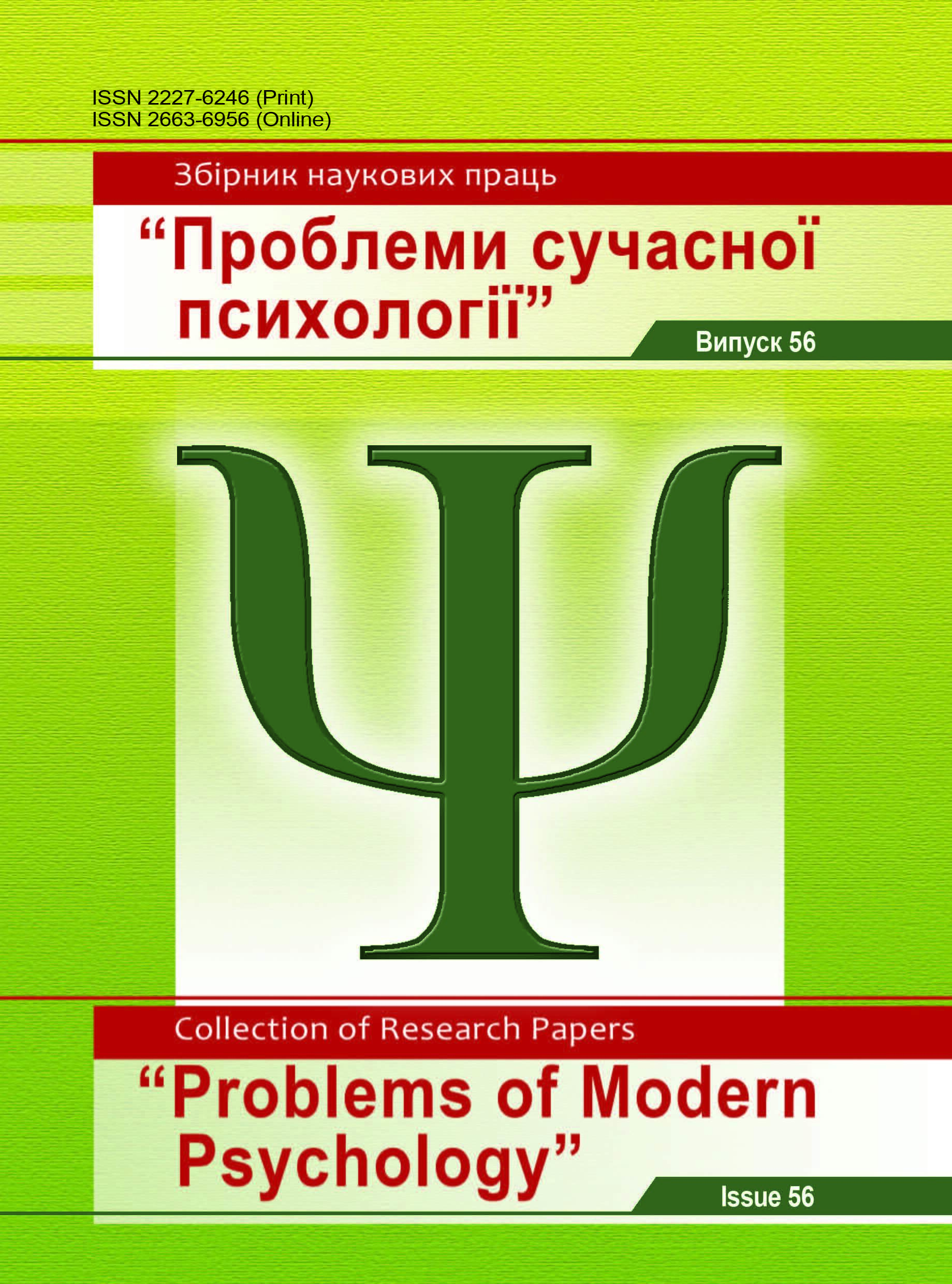Dependence of the Success of Testing Pupils on Social Intelligence of Teachers
DOI:
https://doi.org/10.32626/2227-6246.2022-56.45-63Keywords:
social intelligence, the success of testing, social thinking, social interaction, decision-making, stages of test’s creation, social sensitivity, empathy, self-knowledge, self-regulationAbstract
The purpose of our article is: to describe the most effective means of a cognitive control in the learning process of a foreign language, to describe three main stages of a test creation, to identify final or intermediate (thematic) tests; to show the dependence of the success of testing on social intelligence of teachers.
Methods of the research. The following theoretical methods of the research were used to solve the tasks formulated in the article: a categorical method, structural and functional methods, the methods of the analysis, systematization, modeling, generalization. Also in our research we used empirical methods of the statement study and molding experiment. With the aim to diagnose the level of the development of social intelligence of teachers we used the test of J. Gilford and M. O’Sullivan “Research of Social Intelligence”, adapted by O.S. Mykhailova (Гилфорд & О’Салливен, 2021).
The results of the research. According to our research it is proved that the structure of social intelligence of a teacher had four components, such as: communicative potential, characteristics of self-awareness, social perception and energy characteristics of the individual. The outlined characteristics determine a teacher’s prediction of the development of interpersonal situations, the ability to interpret the information he/she has heard or seen and the behavior of others, readiness for effective social interaction and decision-making. Thus, social intelligence of a teacher contains individual inclinations, abilities, characteristics that facilitate the acquisition of individual personal experience, skills and abilities of social actions and contacts.
Conclusions. Studying the social intelligence of the teacher is defined as the ability to perceive the surrounding and inner world, which allowed professionals at different levels to easily navigate in interpersonal interaction, harmonize their behavior. The structure of social intelligence of the teacher includes social sensitivity, empathy, self-knowledge and self-regulation. Social intelligence of a teacher is identified with certain psychological mechanisms. Social intelligence includes social thinking and wisdom. In such a way we analyze the concept of “social thinking” as a structural component of social intelligence. Social thinking is defined as the ability of the subject to understand and to operate with perceived information. A high level of the development of social thinking allows a teacher to solve problems effectively that are arisen in the process of interpersonal interaction; efficiency means speed, flexibility and accuracy in dealing with the facts of social reality.
References
Benson, P. (2001). Teaching and Researching Autonomy in Language Learning. Harlow: Longman.
Guilford, J., & O’Sulliven, M. (2021). Test “Sotsialnyi intelekt” – Test “Research of Social Intelligence”. Adapted by E.S. Mikhailova. Retrieved from https://lib.chmnu.edu.ua/pdf/posibnuku/160/41.pdf [in Russian].
Honcharuck, Nataliia, & Onufriieva, Liana (2018). Psykholohichnyi analiz rivniv pobudovy komunikatyvnykh dii – Psychological analysis of levels of communicative actions’ constructing. Psycholinguistics. Psykholinhvistyka. Psikholingvistika – Psycholinguistics. Psycholinguistics. Psycholinguistics, 24(1), 97–117. Retrieved from https://doi.org/10.31470/2309-1797-2018-24-1-97-117 [in Ukrainian].
Mykhalchuk, Nataliia, & Ivashkevych, Eduard (2018). Psycholinguistic features of the development of social intelligence of the teacher. Psycholinguistics. Psykholinhvistyka. Psikholingvistika – Psycholinguistics. Psycholinguistics. Psycholinguistics, 23 (1), 242–257. DOI: https://doi.org/10.5281/zenodo.1211618.
Mykhalchuk, Nataliia, & Kryshevych, Olga (2019). The peculiarities of the perception and understanding of Sonnets written by W.Shakespeare by the students of the Faculty of Foreign Languages. Psycholinguistics. Psykholinhvistyka. Psikholingvistika – Psycholinguistics. Psycholinguistics. Psycholinguistics, 26(1), 265–285. DOI: https://doi.org/10.31470/2309-1797-2019-26-1-265-285.
Nunan, D. (2003). Nine steps to learner autonomy. Retrieved in June, 20. Retrieved from: http://www.andrasprak.su.se/polopoly_fs/1.84007.1333707257!/menu/standard/file/2003_11_Nunan_eng.pdf.
Onufriieva, L., & Ivashkevych, Ed. (2021a). Contemporary approaches to the problem of the development of cognitive activity of pupils according to the ways of managing the young learner’s classroom. Zbirnyk naukovykh prats «Problemy suchasnoi psykholohii» – Collection of research papers “Problems of modern psychology”, 52, 61–83. Retrieved from https://doi.org/10.32626/2227-6246.2021-52.61-83.
Onufriieva, L., & Ivashkevych, Ed. (2021b). The development of learner’s autonomy by the way of the formation of social intelligence. Zbirnyk naukovykh prats «Problemy suchasnoi psykholohii» – Collection of research papers “Problems of modern psychology”, 51, 9–32. Retrieved from https://doi.org/10.32626/2227-6246.2021-51.9-32.
Downloads
Published
How to Cite
Issue
Section
License
Copyright (c) 2022 Ivashkevych Eduard, DanchukYuliia

This work is licensed under a Creative Commons Attribution-NonCommercial 4.0 International License.
Copyright
The Editorial Board has the full right to publish original scientific papers containing results of theoretical and experimental research works which are not currently subject to review for publication in other scientific editions. The Author shall transfer to the editorial board of the Collection the right to spread the electronic version of the paper, as well as the electronic version of the paper translated into English (for papers originally submitted in Ukrainian and Russian) by all kinds of electronic means (placement at the official website of the Collection, electronic databases, repositories etc).
The Author of an article reserves the right to use materials of the paper, without approval with the editorial board and the founders of this Collection: a) partially or fully, for educational purposes; b) for writing own dissertation papers; c) for preparation of abstracts, conference reports and presentations.
The Author of an article can place electronic copies of the paper (including the final electronic version downloaded from the official website of the Collection) at:
- personal web resources of all Authors (websites, webpages, blogs etc.);
- web resources of the institutions where the Authors are employed (including electronic institutional repositories);
- non-profit public access web resources (for example, arXiv.org).
But in all cases, it is obligatory to have a bibliographic reference to the paper, or a hyperlink to its electronic copy placed at the official website of this Collection.







